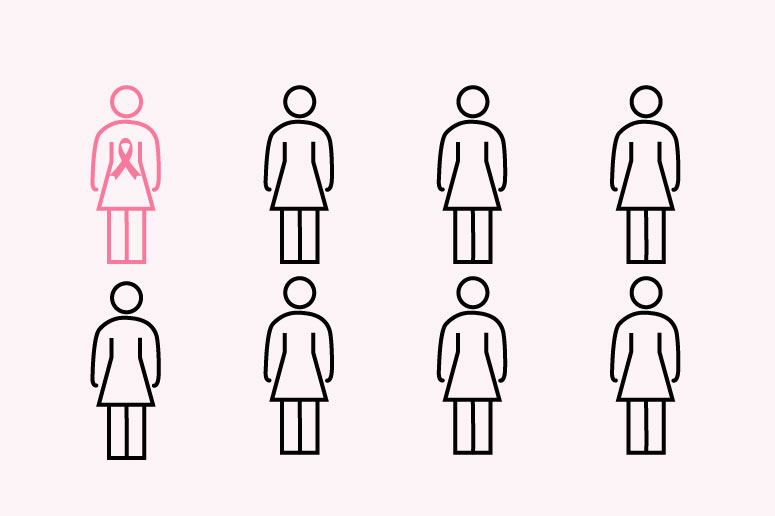Understand What At-Risk for Breast Cancer Means
October 01, 2025

If your doctor told you that you have a “high risk” for breast cancer, you may be wondering what that means and if there’s anything you can do to reduce your risk.
Every woman has some risk of developing breast cancer; however, some women are considered “high risk,” meaning they are more likely to develop breast cancer compared to the general population.
Who’s at High Risk for Breast Cancer?
Many studies have shown that there are a variety of factors that can increase your risk for breast cancer. The most common include being a woman and aging. If you’re a woman over 55, your risk for being diagnosed with breast cancer naturally increases.
In addition, a variety of other factors can increase your odds, including:
- Family history: Having an immediate family member (i.e., parent, sibling, or child) diagnosed with breast or ovarian cancer, especially before age 50.
- Genetic mutations: BRCA1 or BRCA2 are inherited genes that, when mutated, have been linked to breast cancer.
- Dense breasts: Found only during a mammogram, dense breast tissue means you have more fibrous and glandular tissue than fatty tissue, which may make it harder to detect cancer. Supplemental imaging may be recommended.
- Reproductive history: Period started before age 12 or entered menopause after age 55.
- Pregnancy history: Gave birth to your first child after age 35, or never had a full-term pregnancy.
- Atypical breast cells found during biopsy: Abnormal growth of non-cancerous cells (atypical hyperplasia) found in the lining of the milk ducts or lobules (lobular carcinoma in-situ) of the breast that develop an unusual pattern or shape.
- Chest radiation: Radiation therapy to the chest.
- Hormone replacement therapy: Long-term use of hormone replacement therapy.
- Lifestyle: Smoking, heavy drinking, obesity, and a sedentary lifestyle can all contribute.
- Previous cancers: A history of breast or ovarian cancer.
While these factors may be associated with increased risk of developing breast cancer, it doesn’t mean you will ever be diagnosed. With that said, it’s important to note that people without any of these factors can also develop breast cancer.
Four Things You Can Do If You’re at Risk for Breast Cancer
Some risk factors mean you have no control over whether you’re diagnosed with breast cancer (i.e., genetics, family history). However, there’s plenty you can do to lower your breast cancer risk and keep tabs on your health.
1. Regular Screening and Monitoring
Mammograms save lives. Talk to your doctor about what age you should start getting screened and how often you should have breast cancer screenings, especially if you’re at high risk. Don’t forget monthly self-exams; it’s important to get familiar with your breasts so you’ll notice changes early.
2. Schedule a Doctor’s Appointment
Talk to your healthcare provider about your risk of breast cancer and share your family’s cancer history; it can help guide your screening and prevention plan.
3. Talk to Your Family
If possible, have a conversation with both sides of your family to learn about your family’s health history. Your risk for breast cancer increases significantly if your parent, sibling, or child has been diagnosed.
4. Make Healthy Lifestyle Choices
- Eat a balanced diet: Drink water instead of beverages with added sugar, and fill your plate with colorful veggies, fruits, lean proteins, whole grains, and healthy fats like olive oil and avocado.
- Stay active: Regular exercise can lower your risk by helping maintain a healthy weight and regulating hormones. Try swimming, brisk walking, or dancing.
- Limit alcohol: Reducing your alcohol intake, or not drinking, can decrease your risk.
- Quit smoking: It’s never too late. Quitting reduces your overall cancer risk and improves your lung and heart health.
- Manage stress: Use relaxation techniques like yoga, meditation, or even joining a local women’s group for support. Chronic stress can negatively affect immune function.
High-risk breast cancer means taking a proactive approach—knowledge, healthy habits, and regular checkups. If you ever have questions or need support, reach out to your healthcare provider. Staying informed and empowered will help you enjoy every sunny day with peace of mind.
Hope Lives Here
At Memorial Healthcare System, we believe early detection saves lives and prevention is just as important as treatment. That’s why we provide a full spectrum of breast health services to support women at every stage of care. From screening and diagnostic mammograms to high-risk monitoring and genetic testing and counseling, as well as breast cancer treatment and survivorship programs, Memorial offers care that is both compassionate and comprehensive.
Our nationally accredited Women’s Imaging Centers and Breast Cancer Center bring together expert radiologists, oncologists, surgeons, and nurse navigators who guide you every step of the way. Whether you need a routine screening, follow-up imaging, or specialized treatment, we are here to give you peace of mind and the best possible outcomes.
To schedule a mammogram, please call 855-530-2383 or visit our Mammogram page. Your health matters, and early action makes all the difference.



